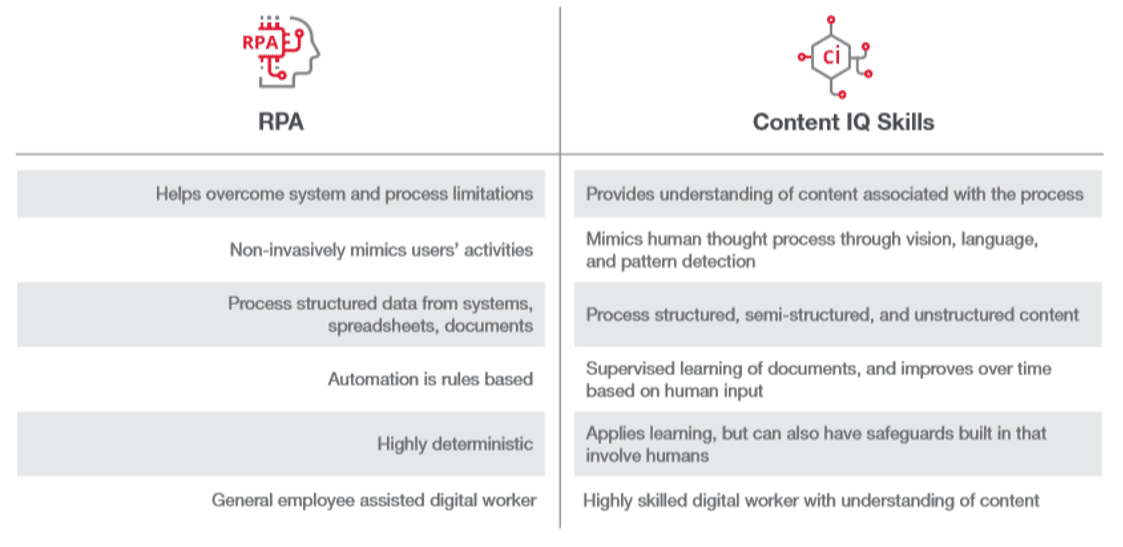What AI Skills Does Your Organization Need for Your Next RPA Project?
Robotic Talent – An Emerging Sourcing Trend to Watch
By: Susanne Richter-Wills, Head of Enterprise Sales DACH at ABBYY
Business process outsourcing (BPO) and Shared Service Center (SSC) organizations have been instrumental in migrating companies to automating processes and introducing them to artificial intelligence capabilities.
As AI becomes more sophisticated, so have the decision makers and users within enterprises. For example, employees are now embracing the benefits of working alongside AI tools. A recent survey found that workers even want to delegate 48 percent of tasks to AI. Among those tasks workers want to delegate are reviewing long documents, inputting data/data entry, checking/updating inventory and electronic filing – tasks that are ideal for robotic process automation (RPA) with intelligent capture.
[emaillocker id=”26087″]Likewise, enterprises are now expecting more from rudimentary AI and automating simple tasks. They want an intuitive understanding of content and the ability to automatically extract all relevant information from documents. As a result, BPO/SSCs are increasingly using RPA digital workers to mimic basic human tasks but need new skills for additional intelligence. BPO/SSCs can expand the use of these digital workers to “intelligently” automate content-centric processes involving images, documents, and text, to further enhance operations and create better customer experiences.
However, RPA has had some limitations while working with unstructured content and has resulted in many BPO/SSCs and organizations alike to take a narrow approach with these technologies – only for specific uses cases such as purchase orders. To grow and expand the use of RPA within an enterprise, robots must become smarter to be able to interpret and understand unstructured content (documents, images, and text) and turn into actionable structured information. RPA should be considered as the starting point for intelligent automation where three digital classes are emerging and where different digital robots deliver varying degrees of cognitive and advanced content IQ skills.
Digital Class 1: Rules
Rules are “tried and true” automation tasks that can be found in every organization. Robots are used to extract and interpret existing applications for the purpose of automating rules-driven transactions. The cognitive content IQ skills include digitizing content, searchable content and screen scraping. An ideal automation candidate for this class involves well-defined activities that are organized in a repeatable sequence, deal with structured data, and include multiple systems requiring data entry or extraction. Processes may require digitizing documents using OCR, and delivery of that content to a repository. This use of rules is the easiest to implement and most widely adopted.
Digital Class 2: Learning
This class utilizes learning to understand and process unstructured content. Robots are thereafter able to understand unstructured content and apply it to process automation. The cognitive content IQ skills include digitizing content, classification, extraction and learning. It makes RPA digital workers smarter so they can automate a wider array of activities involving documents. This type of automation can learn from experience using machine learning to classify and extract data from images, documents, and text – while automatically updating and improving processes to minimize human intervention. Learning is a fast-growing class of RPA that requires the ability to classify and extract data from a wide range of documents while delivering high value to an enterprise.
Digital Class 3: Reasoning
Cognitive robots are subject matter experts – learning from your existing processes, data, and human decision making. This is where robots automate tasks involving intuition, judgment or problem-solving. They mimic human intelligence and judgment. Advanced content IQ skills are used at this level to analyze and understand the text. Reasoning combines advanced technologies such as natural language processing, artificial intelligence, machine learning, and content analytics to mimic human judgment and problem solving to determine things like intent (requested action), sentiment, and the relationship between data. Reasoning is where forward-looking organizations are focusing their digital transformation.
AI helps to learn from content and optimize performance. It can understand and act on unstructured data is critically important to planning and achieving new levels of process efficiency and profit, as well as, aid in the development of new and innovative products and services. Here is the difference between RPA and content IQ skills:
 Content IQ Skills in Action
Content IQ Skills in Action
Here are a few benefits of what content IQ skills can do for organizations:
- Diversity of Documents Handled: Allows you to handle multiple information types, structured and unstructured, including scanned documents images, digital documents (PDF), and email communications
- Number of Languages, Text and Barcodes Handled: OCR technologies support 200 different languages, recognize machine printed text, hand printing, one- and two-dimensional barcodes, as well as checkmarks
- Automated Data Extraction: Automated data extraction from structured, semi-structured and unstructured documents allows you to eliminate error-prone manual keying.
- Automated Processes Trigger Specific Robot Tasks: Once data is captured from a document, data can trigger specific tasks such as queuing for processing and the assignment of work based on workload, or skill-sets, including the suspension of processing when documents are missing.
- Classification and Extraction Learns and Improves Over Time: Ensures that the document identification process can learn and improve over time
- Enhanced Logic to Meet Business Rules: Automates the understanding of documents and transforms that knowledge into actionable, electronic business information to meet business rules and procedures across lines of business
- Human Review and Exception Handling: If data is questionable or fails to pass a validation rule, built in verification allows for human exception handling providing a mix of human and automated decision making when required.
- Integration with Mobile Devices: Take information from mobile devices and extract, validate and integrate that information in the same way you capture information from other sources to drive your business processes. This will help meet employees’ desires to use mobile more. A study has found that 43 percent of workers want to use mobile more for administrative tasks.
- Enforced Compliance: Allows companies to trace and audit the acquisition of data and provides a compliance framework that ensures that each step in a business process meets regulatory requirements
- Operational Efficiency for your Content-Centric Processes: Lower TCO and improve ROI by making Content IQ a natural extension of the way your company does business
Content IQ skills can be combined with RPA or any other intelligent automation platform like a BPM, CRM or EPR to make the software robots smarter and assist in automating content-centric processes. Cognitive skills target activities and skills required by the digital worker to solve specific business problems. Advanced cognitive skills can be designed and trained for specific document use cases to give the digital worker the necessary skills to perform the work that would otherwise be handled by an employee. In the digital world, BPO/SSCs can have the new skills necessary to help organizations achieve their digital transformation goals, and significantly speed business processes to improve the customer experience and increase competitiveness.[/emaillocker]
About the Author
 Susanne Richter-Wills has more than 20 years of experience in the process automation market and has held various senior management positions with international BPO providers, as well as product management positions with leading automation software vendors. She has an excellent understanding of the market and the need for companies today to implement intelligent data capture, AI/RPA and process automation solutions to stay competitive. Richter-Wills is a member of IAOP’s European Outsourcing Council where she supports the DACH, RPA and Digital Transformation activities.
Susanne Richter-Wills has more than 20 years of experience in the process automation market and has held various senior management positions with international BPO providers, as well as product management positions with leading automation software vendors. She has an excellent understanding of the market and the need for companies today to implement intelligent data capture, AI/RPA and process automation solutions to stay competitive. Richter-Wills is a member of IAOP’s European Outsourcing Council where she supports the DACH, RPA and Digital Transformation activities.





